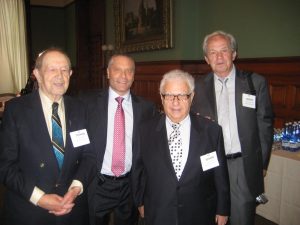The Boy in the Woods by Maxwell Smart
In a memoir published May 3, 2022, this Montreal-based artist recounts his story of survival during the Holocaust.
Born Oziac Fromm in 1930, Maxwell Smart grew up in the town of Buczacz (located now in western Ukraine). Following the Nazi invasion in 1941, he spent years hiding for his life in a Polish forest, aided by a poor gentile farmer named Jasko. Smart eventually came to Montreal through Canadian Jewish Congress’ efforts to bring over war orphans.
It’s hard for me to find the words to capture the emotional experience of reading his story. Smart’s resilience is astonishing, and I was frequently moved to tears. He leaps off the pages through his words, leading the reader through a range of emotions as he recounts in affecting detail those horrible years of suffering, intense loneliness, and the desire for human company. Yet there are equally moments of profound joy in his story, including some moving and unexpected reunions which came later in his life.
In the latter parts of The Boy in the Woods, he details his experiences after arriving in Canada postwar. He recounts the bleak truth that the Jewish community in Montreal was not quite so welcoming, and had little interest in hearing of his experiences. Perhaps this is now difficult for us to imagine, but it was a reality that many survivors encountered here. As Canadian Jews, it is important for us to understand some of our own past missteps.
Smart writes quite a bit too about his art and his desire to create. Naturally curious, upon finishing this memoir, I looked up images of his remarkable paintings. They called to my mind a lyric written by Jonathan Larson: “The opposite of war isn’t peace. It’s creation.” If war is destruction, then to create is its antidote.
And, over the course of his life, Maxwell Smart has created so much.
Truly, I am moved by this story, and I thank him deeply for sharing it. A very important read.

Afterlight by Isa Milman
A finalist for the 2021 National Jewish Book Award—and it’s not hard to see why.
Isa Milman poignantly relates the story of her parents’ survival during the Holocaust, as well as her own search for her family’s history—in particular, for the poetry of her mother’s twin sister, who perished.
Though a memoir, Afterlight is as engrossing as any good novel. The Victoria-based writer’s narrative of her family’s history is compelling, and her prose is often poetic. Her parents’ story is harrowing, and important, too: we don’t often enough read about survivors whose war experiences were largely in the Soviet Union.
Milman’s personal accounts are also interesting. She reckons with the legacy of the Holocaust, attempting to reconcile her long-held feelings about Poland with new impressions she forms during the course of her research.
Her journey will be familiar to readers with roots in eastern Europe who have taken on the burdensome endeavour of parsing together a family history. (As my family’s unofficial genealogist, I myself have come across this challenge, having been unable to trace back more than a few generations, with very little information at my disposal.)
In a particularly memorable section early in the work, Milman muses on the meaning of physical places of burial as a means for living descendants to properly memorialize—and, in a way, commune with—their ancestors. Those lost in the Holocaust were robbed of this tangible marker of place.
The book’s subtitle, “In Search of Poetry, History, and Home,” is incredibly apt. Milman considers all three subjects as questions throughout: How does one search for poetry? How does one search for history? And how does one search for and understand the meaning of home?

Memory’s Shadow by Gail Benick
Following the fictional Berk family sisters throughout the 1970s and the early 1980s, this is a powerful story of sisterhood, of intergenerational trauma, and of the long shadow that memory casts on the past.
The two eldest Berk daughters—Hetty and Tilya (who now goes by Toni)—and their parents are survivors of the Lodz Ghetto, while the younger two–Terry Sue and Linda Sue—were born in America.
Memory’s Shadow takes place at a time that predates widespread reckoning with the Holocaust in the American public conscience. Consider that the impactful miniseries Holocaust, which garnered over 100 million viewers in America alone, and was a considerable factor in raising greater awareness, didn’t premiere until 1978. Gail Benick’s fiction also notably takes place before any major video testimony projects were initiated.
Those of the family who survived the Holocaust suffer in private. They refuse to speak of their experiences, a cause for much conflict throughout the novel.
The narrative is set among the social upheavals in America during this period, as each sister grapples with the suffering that continues to impact the family’s present, meanwhile caring for their aged father. (The mother has passed before the events portrayed here.)
With Memory’s Shadow, Benick has crafted a captivating story, as the Toronto author writes each sister with a distinct voice—with her own worldviews, passions, guilts, and burdens.
Linda Sue, for instance, is desperate for the information which has been withheld from her the whole of her life, including by her sisters. This is a desire she shares with Hetty’s son Josh, and together they embark on an investigative trip to Poland to piece together their family’s story. This endeavour has a profound personal impact and affects their relationships with the rest of the family.
Benick’s novel is touching, and it leaves readers to consider the complex impact of Holocaust trauma and memory.
Hannah Srour is a member of the Association for Jewish Libraries’ (AJL) Jewish Fiction Award Committee and sits on the executive board of AJL-Canada. She can be reached at [email protected] or on Twitter at @srour_hannah.







